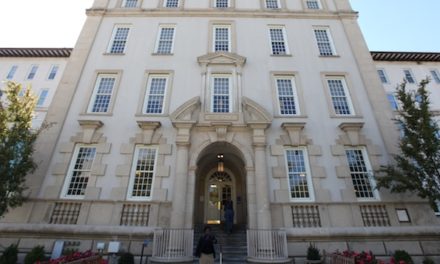This op-ed was written as part of a two-sided debate series. The opposing argument can be found here.
Power-Hungry. Incompetent. Erratic.
This was how the Wheel Editorial Board, a board I am part of, described Student Government Association (SGA) President Dwight Ma (17Ox, 19C) in a piece urging his impeachment. It is an opinion I no longer hold.
Ma faces three allegations of misconduct: violating the Constitution by firing Elections Board Chair Justin Cohen (20C), intimidation and abuse of power toward Vice President of Communications Tiffany Haas (19C) and lack of oversight over SGA’s spending problem.
However, none of Ma’s actions are impeachable offenses, and he deserves to finish his term in office. The Rules and Procedures of SGA say reasons for impeachment include “gross violations of the Student Constitution or bylaws of the SGA, failure to perform the duty of one’s office, study abroad, violation of the applicable school’s Honor or Conduct Codes, gross unethical [and] abuse of power.”
A Feb. 13 hearing before the Constitutional Council addressed whether Ma violated the Constitution by firing Cohen.
Ma may not have had the power to fire Cohen, as the Constitutional Council declared in their recent ruling, Cohen vs. Ma, which established that Ma crossed constitutional boundaries in firing Cohen. However, this decision is the first to formally establish that the Elections Board Chair is subject only to the legislative branch, not the executive branch.
Therefore, Ma’s assumption that he could fire any non-elected member he appointed was imprudent, but not wholly unreasonable. The Constitution does state that “all non-elected members and officers serve at the pleasure of the President of the SGA.” Ma had no way of knowing the limits of executive authority before those limits were established.
Ma took drastic action by firing Cohen, but that intervention was necessary. Cohen decided to set the election schedule during winter recess, meaning Ma was unable to gather the legislature to deliberate. One can see how Cohen’s rushed measures may have required a similarly hasty response. Cohen vs. Ma states that “the Council will offer no official recommendation on whether Cohen should have been removed from a normative perspective,” noticeably casting no judgment. Ma may have overstepped his role, but in this case, his action was justified by exceptional circumstances.
As such, Ma’s removal of Cohen does not constitute grounds for impeachment.
Ma told the Wheel he fired Paul Park (17Ox, 19B) on Jan. 11 due to reports of “unprofessional” behavior. Park’s failure to immediately inform SGA legislators about overallocating more than $28,000 was, by all means, unprofessional. While some would argue that Ma should take responsibility for the overallocation, he could not take responsibility for something he was never informed about. Ma even claimed that he repeatedly asked Park for the information.
Faced with difficult circumstances, Ma’s decision not to quickly resolve SGA’s overallocation problem made manifest his strength as a leader. Ma faced pressure from Finance Committee members, including Park, Mo Singhal (22C) and Linda Zhang (17Ox, 20B) to slash $45,000 from the Media Council budget to address the deficit, an inept and dangerous attack on the arts at Emory, as argued by WMRE Treasurer Shannon Anderson (20C) in a Feb. 6 Wheel op-ed. By tabling that discussion, Ma did not compromise SGA’s integrity; in fact, he protected it.
Haas accused Ma of abuse of power and threatening behavior in regards to one particular message he sent to her: “if you continue speak [sic] something that I am not aware or I’m not informed, it will be a problem.” One could interpret the text maliciously, as Haas has, but the statement itself is vague. Ma’s language is sometimes unclear, as English is not his first language, but intention is important. Ma maintains that he did not mean the text as a threat. If Ma were as erratic and power-hungry as others claim, he probably would have fired Haas already, as he did Chief of Staff Ben Palmer (18Ox, 20C), Park and Cohen.
Furthermore, SGA’s decision to hold a closed-door session to vote for Ma’s impeachment is an affront to Emory’s transparency and democratic processes. Ma was elected democratically by a significant margin of 977 votes, and his voters and community should have access to the evidence of the closed-door session if SGA plans to remove him.
Finally, none of Ma’s actions constitute grounds for impeachment. Although his methods may not be perfect, Ma genuinely did what he thought was best, sometimes under duress. Legislators must allow Ma to finish his presidency.
Ryan Fan (19C) is from Stony Brook, N.Y.



